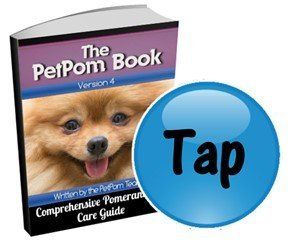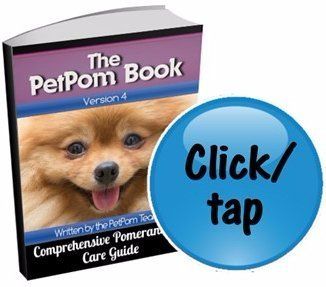Rescue Poms
PetPom

The
Pomeranian
Information
Center
Caring for a Rescue Pomeranian
Taking Care of a Rescue Pomeranian
We've received a lot of email suggestions to write an article about exactly how to care for a rescued Pomeranian. Owners wonder how to help a Pom that was previously neglected and/or endured a shelter situation.
What is the best way to care for a rescued Pomeranian? What are the best ways to socialize a rescue Pom? What tips for caring will best help a rescue Pomeranian adjust and thrive in a new household? What type of behavior is normal and expected?
These are common questions for those who have taken in a little Pom that needed a new, loving family.
To discuss these points and more, here you will find a special article, followed by a helpful section regarding Questions About Rescued Pomeranians.
We're pleased to have a special guest writer to address all of the questions you may have and offer excellent tips for caring for a little Pomeranian that you may have rescued or adopted from a shelter or other bad situation.
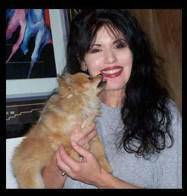
Meet our guest writer:
Vikki Chavez of TinyDogsRule runs a Pomeranian rescue and has over 10 years of experience of saving abused Poms and raising awareness to help stop puppy mills. She is a lifelong equestrian, animal welfare advocate and mom to the TinyDogsRule Pom pack.
Her Pom adventures started over 10 years ago with an online Pomeranian puppy purchase. It became apparent very quickly that her adorable puppy had both temperament and health issues. A call to the breeder yielded a disconnected number.
And so began her unrelenting passion for rescuing and rehabilitating the little Pomeranians that so often fall victim to neglect, abandonment and puppy mill cages.
Using her extensive health and nutrition background, she works continuously to find the most effective ways to heal her beloved Pomeranians.
She shares her New Mexico home with her husband, horses and her pack of Pomeranians gathered from all walks of life. Many of them have special needs, and all of them flourish and thrive under her special care. In this special section, she shares some important tips and information that she hopes will help your rescued Pomeranians live safely and happily ever after.
Please note:
1)To help all owners of rescued Pomeranians, this article encompasses a variety of elements that may apply to a rescue puppy or dog. The Poms taken care of by Vikki may have some of the care elements that are mentioned already done (such as a destroyed, matted coat being shaved down or getting the dog up to a healthy weight). This article covers elements that may or may not apply, depending on where you adopted your Pomeranian from and what type of condition the puppy or dog is currently in.
2) All photos in the article are courtesy of Vikki Chavez and are covered fully by copyright laws.
All About Rescue Pomeranians
Author: Vikki Chavez
Blessings to those of you who open your heart and home to a rescue Pomeranian! Many rescues spent their lives in cages, neglected for many years in puppy mills or backyard breeding operations. Others were dropped off at kill shelters when old age or health problems arose, the family moved, they were too yappy, peed on the floor, required money for vet treatments, or simply did not get along with a new boyfriend, girlfriend or pet.
Your adopted Pomeranian may have lived alone outside under a porch or left crated in a garage for some time before being dumped off at the shelter or a remote country road. Sadly, some rescues come from conditions you cannot imagine.
Many have been fenced in packs, surviving the elements with little to no human contact. They may have never known indoor living or the feel of grass under their paws. Dental issues are common in most rescue Poms, and they may need their teeth pulled.
They usually need to be shaved down to remove deeply matted hair, and often have ticks, fleas or skin issues that need treatment. Your new rescue will need a complete vet exam and blood work to get started on his/her happy, healthy life.
If you get your Pom through a rescue organization, he/she may have some initial veterinary care and socializing via a foster home. Either way, expect to spend plenty of time helping your new friend settle in.
Here are some tips to ensure your little angel has the best life ever!
Quality Care for a Rescued Pomeranian
• Peaceful Space -
The best way to acclimate your new rescued Pomeranian is to use a large exercise pen placed in a quiet area of your home where he can see and hear you, but be safe. Place an open carrier or dog bed in one corner with lots of soft bedding, a few stuffed toys, fresh water and pee pads. Now your Pom has all she/he needs to feel at home.
From this safe place, your Pom can get to you know you and the family routine without being under foot, at risk, or stressed by potty issues.
Let your Pom sleep in his space, stay there when you are away, be safe there if you have company over, and have a quiet haven from seasonal fireworks, lightning storms, blasting televisions and so forth.
It is important for all dogs - and particularly rescued Pomeranians- to have a comfortable, clean and safe space of their very own.
From this safe place, your Pom can get to you know you and the family routine without being under foot, at risk, or stressed by potty issues. Let your Pom sleep in his space, stay there when you are away, be safe there if you have company over, and have a quiet haven from seasonal fireworks, lightning storms, blasting televisions and so forth.
It is important for all dogs - and particularly rescued Pomeranians- to have a comfortable, clean and safe space of their very own.
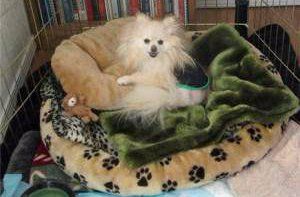
• Excellent Nutrition -
This is an important element of caring for a rescued Pomeranian. Due to past living situations, the dog may have a sensitive digestive system, and less is more when you get them home. Select a 5 star rated, made in the USA quality dog food with small enough kibble for toy breeds. Feed two times per day in small amounts each time, and do not add treats until you see how your new puppy or dog is adjusting.
If your pup has bad teeth or no teeth, feed a canned, wet food and be sure to drain/remove the gel that surrounds it before feeding. Store in container in the refrigerator and let each meal portion sit in feeding dish for about 10 minutes before feeding so it can warm up a bit.
It is not uncommon for shelter dogs to be a bit under-weight and part of caring for a rescued Pomeranian is to make sure that putting on weight is done carefully. Feed 4 times per day in small amounts and gradually increase amount per feeding and decrease feedings as your Pom gains strength and weight.
If your Pom is overweight, try a reduced fat food. Boiled skinless chicken shredded into super tiny pieces with a bit of boiled, skinless yam are usually well tolerated, and healthy to add to your dog's diet.
Ask your vet about probiotics, prebiotics and digestive enzymes if your pup has ongoing stomach upset or diarrhea.
• Veterinary Care -
Your new Pom may need blood tests to determine overall health and to rule out heart worms or erhlichia and other tick borne diseases. A wellness and dental exam plus stool sample to check for worms is also advised. A note of caution! While your Pom needs quality vet care upon arrival, develop a ‘first things first’ plan with your vet. There is no need to load up on vaccines, medications, procedures, grooming appointments, spay/neuter, Heartguard pills and flea prevention topical all at once!
Identify where your Pom is at, and prioritize what is needed.
Dental and heartworm/tick borne concerns need to be resolved right away, and done so based on the health of your Pom.
If a rescued Pomeranian needs to have the coat shaved down you will have to watch closely for chills and overheating, as well as drafts in sleeping area. Blankets they can crawl under or out of are great. Sweaters are perfect for trips outside, but remove inside to prevent overheating.
Rabies shots are required by law and your vet may advise doing them right away. Spay/neuter is in the best interest of your pom. Ask your vet when would be the safest time to do that based on his/her age and overall health.
If your dog is healthy enough to go under anesthesia, that can be a good time to do nails and ear cleaning and micro chipping to avoid the stress of doing so on a dog that is already having lots going on, and might not be comfortable being handled. D2PP vaccines can be given every three years based on risk, environment, exposure and age. Choose the three year rabies shot, as well. There is no need to over vaccinate your dog. Ask your vet!
• Do Your Research Get second opinions, ask questions and follow your instincts.
You are your Pom’s advocate, so the more informed you are the better! Be vigilant about medication dosing, storage, and possible interactions with other medications or herbal remedies. Ask your vet about holistic options. Follow all surgery after care instructions exactly as directed by your vet.
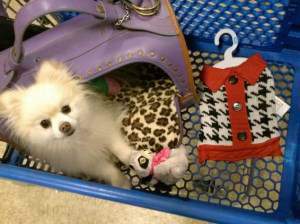
Protect Your Pom
• Use a carrier when you take your Pom anywhere!
Keep them contained at the vet and their carrier seat belted in the back seat of your car for driving safety. When a rescued Pomeranian is in unfamiliar surroundings he may be nervous and unpredictable.
Many Poms get badly injured jumping off couches, laps, decks, grooming tables, veterinary tables, out of your arms or shopping carts.
A carrier helps them feel safe, and protects them from jumping, falling, aggressive dogs, cars, strangers, and running away.
Protect Your Pom
• Use a carrier when you take your Pom anywhere!
Keep them contained at the vet and their carrier seat belted in the back seat of your car for driving safety. When a rescued Pomeranian is in unfamiliar surroundings he may be nervous and unpredictable.
Many Poms get badly injured jumping off couches, laps, decks, grooming tables, veterinary tables, out of your arms or shopping carts. A carrier helps them feel safe, and protects them from jumping, falling, aggressive dogs, cars, strangers, and running away.
Editor's note:
See also: Best Car Seat for a Pomeranian
• Never leave your pom unattended in the carrier!
In a split second, your Pom can be stolen, overheat in a car, or fall off a bench or table in the carrier. Your Pom is not safe unattended anywhere, not even your yard. Loose or aggressive dogs, coyotes and hawks have been known to snatch up a Pom from a yard or off a leash in a heartbeat. Pay attention at all times.
• Prevent escape!
In a split second, your Pom can dart to the road and get hit by a car, run away through a small area under a fence or out through an open gate.
Your new friend does not know where she/he is, and needs to be watched very carefully. Have a collar with embroidered phone number plus tags and microchip your pup.
Also, prevent unwanted access to front or back doors by using dog safe barriers and ex-pens, and limiting the area of the house that your new Pom has access to. Keep your Pom in her/his peaceful space when having barbecues, parties and so forth.
• Prevent escape!
In a split second, your Pom can dart to the road and get hit by a car, run away through a small area under a fence or out through an open gate. Your new friend does not know where she/he is, and needs to be watched very carefully. Have a collar with embroidered phone number plus tags and microchip your pup.
Also, prevent unwanted access to front or back doors by using dog safe barriers and ex-pens, and limiting the area of the house that your new Pom has access to. Keep your Pom in her/his peaceful space when having barbecues, parties and so forth.
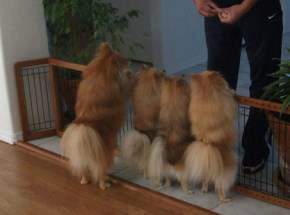
• Use a harness and leash.
Use a collar for identification, and a harness for yard walking. This will protect the fragile trachea area and prevent choking in toy breeds. Editor's note:
See also:
How to Choose a Harness and Collar for a Pomeranian
• Other dogs can be dangerous. Keep a close watch on your other pets. Your current dogs are on their home turf, and may be protective or resent the new pup. It is best to let your rescue get used to other family dogs via plenty of supervised sessions to make sure your Pom is accepted and safe. It only takes a minute for things to turn south.
Some behaviors common with rescued Pom are exhibiting fear based aggression or having timid behavior towards other dogs, which can escalate problems.
This is also true when leash walking, so be alert and aware when around all dogs. It is safer to pick your Pomeranian up if you encounter an unknown dog on a walk. A dog fight will not end well for your little rescue!
Pay Attention
• Part of caring for a rescued Pomeranian is to really get to know your new canine family member. Know what is normal, so you can feel when something is off. The behavior of rescued Pomeranians is often being stoic. These dogs may hide their pain, discomfort and fear. You will need to know when something has changed, what increases stress, and be able to sense an injury or onset of illness.
• Your rescue is not used to you or anything around this new environment. Know where your dog is at all times, and be alert to hazards! Did food fall on the floor? Is your pup in the kitchen? Are a group of kids about to open the front door at any minute? Is your Pom near the door? Are there marbles down in the family room? Is there a bowl of candy on the floor by your children playing? Rescues are usually not house savvy, and have no idea what is off limits or unsafe for them. They are counting on you to puppy proof your house, even if they are 12 years old!
Common and Expected Behaviors of Rescued Pomeranians - Having Realistic Expectations
• A rescued and adopted Pomeranian may display a lot of emotions.
He may be shy, terrified, aggressive, or detached. Spinning, pacing, barking and stress related panting may occur. These are normal behaviors in a rescue dog. If your Pom does not want contact with you, let them come around on their own. Speak kindly as you feed and care for them without any pressure. Sit beside their ex-pen area and wait. They will come to you.
Rescues may not know what toys are, but get some small stuffed squeaky toys and they tend to get playful and interested quickly. You can also hand feed some canned dog food without petting them; a stress free way for them to feel safe around you.
By using their peaceful space, it allows them to relax and bond with you in no time. Add an herbal calming aromatherapy collar to help alleviate spinning due to nervousness, pacing back and forth, or panting. Some people have good results with Bach Rescue Remedy for Pets (do not use the human version, it contains alcohol), compression shirts or calming wraps.
• Your Pom may be a bit wild.
Some are so excited to be free; they fly around the house, try to escape outdoors, and do not want to be held. They are best left with lots of toys and playing fetch (they learn quickly!), and not forcing them to be held.
This type of Pom is likely to be a lap, arm and bed jumper so take special care when handling them. They may also be super happy with other feisty dogs to hang out with, and blend readily with your home crew.
• A previously neglected or abused Pomeranian may be super clingy
once they find their way to your loving home. This means stress is likely when you are out of sight. Speaking to them can help, so they know you have not left the house.
Eventually, hearing you moving around will be enough to reduce anxiety. You may need to hold them, pet them, let them hang out on your lap, and sleep in an area beside your bed at first. Gradually, add small sessions leaving them alone. It takes time in order for them to feel secure in the fact that this is their forever home, and everything is okay now.
• Housebreaking may be a bit tricky.
One thing to keep in mind when taking care of a rescued Pomeranian is that the dog may not be able to become fully housebroken. Many rescues have never had to hold the urge to go. They went wherever they happened to be. Soiled drinking water (or lack of water) may have caused some kidney or urinary tract issues. Many are older and/or intact which makes housebreaking even more difficult.
Most Puppy Mill and backyard breeder Poms are used to going in their small cage, and have lost all natural instincts that would normally have them choose to separate feeding and sleeping areas from peeing and pooping. Many will even eat poop out of habit, stress or boredom. They tend to mark everything, and may never quit marking or learn to go outside consistently.
It will take time, patience and compromise on your part. It is important not to reprimand them for going in the house, as they have no concept of holding it! You will only scare them.
Bellybands and diapers can prevent marking and accidents, but must be used correctly. They should only be used in between frequent outdoor potty breaks, like special time out on carpet for play with family to discourage marking.
They should never be used in their own room; use their pee pads. Bands are not a substitute for housebreaking via potty times outside and indoor ex-pen pee pads, and misuse of them will stress your pup, send mixed messages and result in urine burns.
Do use a Depends cut in half (or similar absorbent pad) and gently rinse and dry your Pom's skin after removal of band/diaper if marking or peeing occurred.
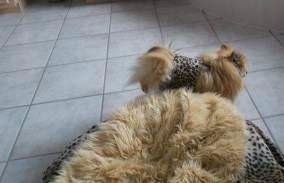
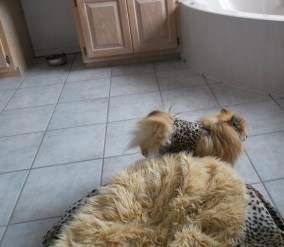
• Crates are not a good choice for most rescue Pomeranians.
Tiny dogs cannot hold their pee for long periods of time, and being caged is all many neglected or abused Poms have ever known. The stress of containment is often traumatic and damaging for them.
A peaceful space of their own will help them live safe and free, while protecting your house from accidents.
Add plenty of pee pads, frequent outdoor jaunts on a harness and meticulously managed, limited use of belly bands (boys) and diapers (girls) mentioned above, and you can kindly and successfully navigate all challenges.
Leaving a canine playpen open for easy access with lots of bedding and toys inside allows them go in and out freely. That way, if you ever do need to keep the Pomeranian confined there, they will be used to it.
Love Heals
Love heals your Pom, and you! Rescued Pomeranians live in the moment and have a tremendous capacity to move forward from past abuse.
Seeing them running, smiling and enjoying life for the first time in a very long time (if ever) is an overwhelming and wonderful thing!
All because of you, they have a second chance at a real home with love, warmth, full bellies, fresh water, comfy beds and awesome, playful, secure, and never ending happiness. There is no greater joy than watching the light return to a rescue Pom’s eyes as he/she thrives under your loving care!
Love Heals
Love heals your Pom, and you! Rescued Pomeranians live in the moment and have a tremendous capacity to move forward from past abuse. Seeing them running, smiling and enjoying life for the first time in a very long time (if ever) is an overwhelming and wonderful thing!
All because of you, they have a second chance at a real home with love, warmth, full bellies, fresh water, comfy beds and awesome, playful, secure, and never ending happiness. There is no greater joy than watching the light return to a rescue Pom’s eyes as he/she thrives under your loving care!
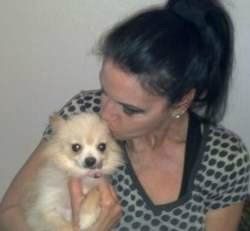
PetPom wishes to thank Vikki for her time and effort in sharing her advice. We continue on with a helpful Q&A session with Vikki to answer your most pressing questions about taking care of a rescue Pom.
Looking to care for a rescued Pom?
If you have been wanting to adopt a Pomeranian that is in need of a loving home with understanding and patient owners, you may want to reach out to Pawsitively Pom Rescue.
They are a non-profit animal rescue licensed by the Commonwealth of Pennsylvania. This rescue group saves, nurses back to health, fosters & works hard to find new homes for Pomeranians that were neglected & abused.
Looking to care for a rescued Pom?
If you have been wanting to adopt a Pomeranian that is in need of a loving home with understanding and patient owners, you may want to reach out to Pawsitively Pom Rescue. They are a non-profit animal rescue licensed by the Commonwealth of Pennsylvania. This rescue group saves, nurses back to health, fosters & works hard to find new homes for Pomeranians that were neglected & abused.
You May Also Like:
Important Pomeranian Supplies
- What you should have to take optimal care of your Pom.
If you are not already a member, become a free PetPom Member, to receive a reminder when we add new information to this site.
If you email photos to us, you agree that PetPom is given free copyright to use at our discretion. We will always credit the photo to the name of the Pom's owner(s) if it is supplied.
Email: Contact@PetPom.com
All text, images and artwork protected by US and International copyright laws. All rights reserved. Copyright PetPom.com
We are a participant in the Amazon Services LLC Associates Program, an affiliate advertising program designed to provide a means for us to earn fees by linking to Amazon.com and affiliated sites.

